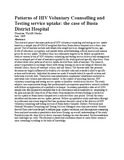| dc.description.abstract | This research project discusses patterns of HIV voluntary counseling and testing service uptake based on a sample size of 4294 of weighted data from Busia district hospital over a three-year period. Unit of analysis include individuals who sought services, disaggregated by sex, age, levels of education, occupation, and marital status notwithstanding referral sources and reasons given for service uptake. Feedback from key informants targeted in the follow up qualitative study at various levels of HIV voluntary counseling and testing service delivery and management were an integral part of unit of analysis as guided by the study goal and specific objectives. Units of observation were patterns of service uptake derived from units of analyses.
The research project is grounded in exchange theory with strong leaning on micro-sociological theories like rational choice, theory of reasoned. action, and role theory. The theories state that personal decisions are largely influenced by tendency to calculate risks and rewards li-nked to specific actions and behaviour. Individual decisions are made if rewards linked to specific actions and behaviour override risks. Theoretical conceptualization emphasizes voluntarism anchored in. individual own volition and informed consent. In the context of preceding theories, HIV voluntary counseling and testing service uptake is therefore viewed as an elective.
The study adopts a non-experimental design that predominantly incorporates quantitative research methods with follow-up application of a qualitative technique. Secondary quantitative data set of 4294 sample size was purposively sampled due to its convenience and accessibility in· responding to the goal and specific objectives of this study. Generalizability of study findings is limited to service uptake at Busia district hospital over a selected three-year period. Overall the study identifies and discusses service uptake patterns.
Follow-up qualitative study undertaken through key informant interviews targeted first line personnel deemed critical to the delivery of HIV voluntary counseling and testing services at Busia district hospital. District, Provincial and. National Voluntary Counseling and Testing Services Managers were also interviewed. Results derived from interviews helped to address gaps, explain variations, and discrepancies emanating from analyzed secondary quantitative data hence firming-up overall understanding of the study. Results by specific objectives to derive summary findings are also discussed. Recommendations and challenges are cited. Way forward is stated and conclusion drawn to make future research more rewarding by adding to the body of knowledge. | en_US |

